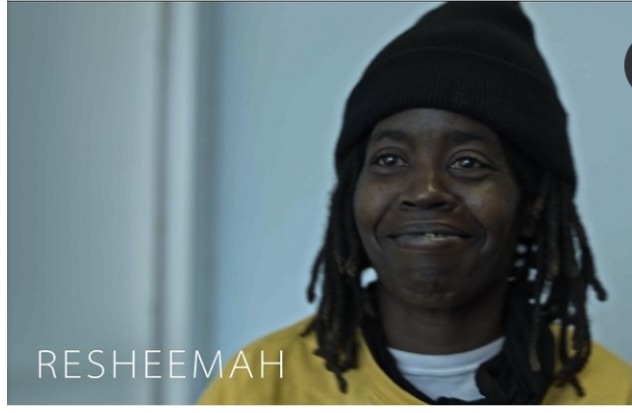
On any given night, over half a million Americans experience homelessness. A 2019 count indicated more than 4,000 unhoused residents live in Oakland.
Resheemah White, also known to friends as “RoRo,” was one of them for four years.
I met her by chance one day at Noah’s Bagels on Grand Avenue by Lake Merritt when we struck up a conversation during a long wait to place orders. I mentioned that I always remind myself that waiting for a few extra minutes is a first world problem. She laughed and we chatted a bit about being grateful, and then she asked me out of the blue, “Do you have Netflix?” and went on to explain that she is one of several people featured in Lead Me Home, a new documentary film by award-winning filmmakers Pedro Kos and Jon Shenk of Actual Films, a San Francisco-based film production company which focuses on personal, historical, and political stories from around the world.
Alana Romund, the production coordinator, said that when the filmmakers first met White while filming in Oakland, “we just loved her immediately.”
Lead Me Home focuses on several personal stories of unhoused people across age, gender, and racial demographics in Los Angeles, Seattle, and San Francisco, though footage and people also include much of Oakland. Subjects include White and a man named Luis, who is also from Oakland. The film is more timely than ever, as the unhoused population has doubled during the pandemic. The filmmakers shot the documentary from 2017-2020.
Lead Me Home is a compelling film that humanizes many people in a short window of time; it is now short-listed for an Oscar nomination in the Documentary Short Subject category. The film takes an unflinching look at how people spiral to eventually become unhoused, and the actuality that many of us are just a paycheck away from being in that same situation. Childhood trauma, drugs, mental health issues, lack of healthcare and family support–somehow the film is both hard-hitting yet engaging and not dogmatic.
Lead Me Home features a range of people, from a talented dancer to a woman at the beginning of her pregnancy and another woman, already the mother of three children, close to the end of her pregnancy. There are moments of tenderness and friendships; there are stories of assault and fear and not knowing what to do next.
Resheemah White’s experiences show how a person can transition from being unhoused to someone who, with the supports of both friends and governmental agencies, is now leading a life where she not only has a home, but has turned around to help others who are in situations she fully understands and supports with the compassion that comes from first-hand experience.
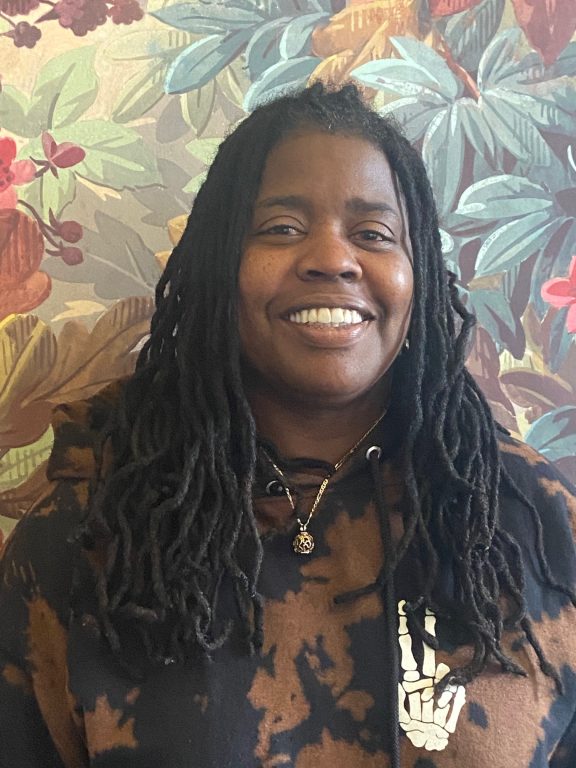
Kos explains how they met White. “We met Resheemah through Luis Rivera Miranda who we had been filming since 2017. We met her the morning they were cleaning Lake Merritt recreational park as part of the Oakland Downtown Streets Team and we were immediately struck by her openness, warmth, and kindness. We could tell right away that she had a special bond with Luis and had been a vital pillar of friendship and support for him.”
Born in Oakland, White’s father’s military service moved the family around a lot. But, she returned to Oakland when she was 18, and moved in with her grandmother in 1990 and helped take care of six other grandchildren. White felt that she needed to focus on her own needs, and enrolled in Laney College, but the need for a job interrupted her studies there. She got a job at the Port of Oakland, which was her means of support until they downsized in 2004 and she was laid off.
“That’s where my life spiraled out of control,” White told me when I met her at her home in downtown Oakland. “I was staying with family members, I was in relationships, staying with other halves,” she commented, adding “But no money, no honey,” and she wound up couch-surfing. “But I felt like they were mooching off me. The purpose of staying was to try to stack some money but I had to provide food, electric, rent, putting a dent in my pocket.” In 2008, she explained, “I resorted to the streets as a survival tactic. I did whatever it took for me to survive to a certain extent, such as selling drugs.”
In the film, White is unrecognizable compared to how she looks today. She is seen in the sit-down interviews with a more thin face wearing a black beanie and bright yellow sweater. Some teeth are missing. As none of the subjects are named until the credits at the end, I was not initially sure which of the women in the film was her. And unless you recognize the streets of Oakland, one might also think the Oakland scenes take place in the city.
During one of the film interviews, White comments that her “stomach is almost touching her back” due to hunger, which were also the same words she used to describe her time of living on the streets when we met at Noah’s.
At some points in being unhoused, White says she would try to stay with people; other times she would ride BART from one end of the line to the other or take the 800 bus until late at night. Other times, she would walk the streets of Oakland all night, from 106th and MacArthur to International Boulevard and back, until the sun rose. Sometimes, she would sleep in a park in East Oakland, rarely more than two or three hours at a time. She would sneak into Motel 6 or Days Inn on Hegenberger when the maids were cleaning to grab a shower, or go into McDonalds’ bathrooms and “take a bird bath” at one of the sinks, sometimes getting caught. She pitched tents under bridges and freeway overpasses.
White was never physically attacked, but was threatened from time to time. “I was one of the fortunate ones, I was lucky,” she told me. In the documentary, several people share stories of being attacked or beaten; violence or the threat of violence is ever-present.
White was later arrested for selling drugs and spent what she describes as “a county year in Santa Rita.” At Santa Rita, she was introduced to a program called “Chrysalis,” which she credits with helping her find herself and where she needed to be in life. “I got closer to my higher power. I realized all the things that I’ve done that are self-sabotaging.” The six-month court-mandated program includes meditation, art groups, and shared cooking responsibilities.
“I graduated and left that life alone,” but she soon found herself once again without a home to live in, just as she became a nanny in a children’s daycare center. After about 18 months, the owner said he could not afford to pay her any longer.
At this moment, Abigail Ford, the mother of three of the children who had been at the daycare center, stepped in and hired her to care for her children as a private nanny, initially in Oakland, and later in Concord when the family relocated there. White calls Ford her “savior.”
“Abby believed in me when I didn’t believe in myself,” White says. “She invited me to her house, a perfect stranger, to open her house, to give me the key, to watch her kids. I can honestly say she saved me.”
I called Ford to ask about White and their relationship. “RoRo is a great communicator. My kids really connected with her, she was great with my kids. Her life is the exact opposite of when I met her. She is a great writer. She continues to be an anomaly. She’s kind.” Ford and her family recently relocated to New Jersey but remain in touch with White, and she feels she got a very deep look at the unsheltered population and issues in the Bay Area and looks at unhoused people differently now.
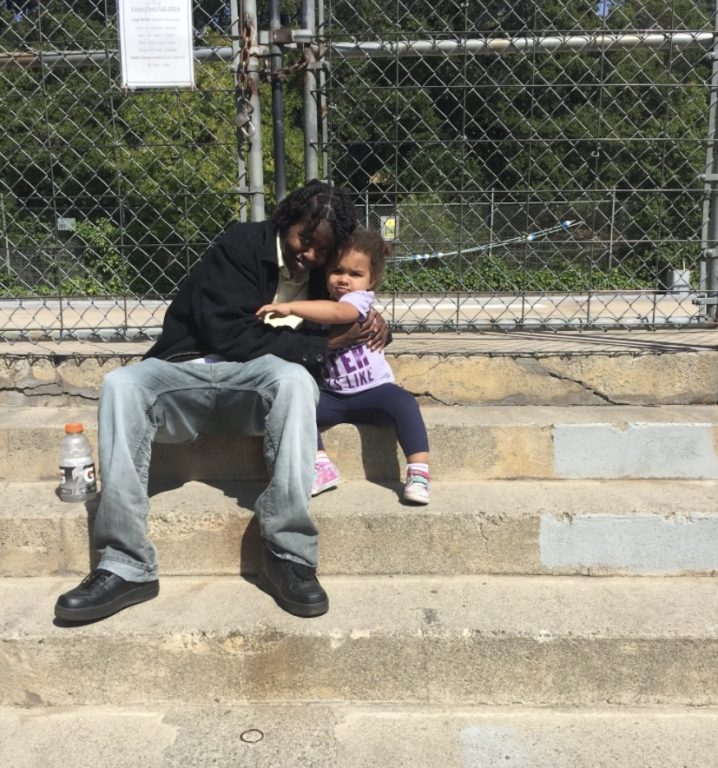
Although Ford and her family have since relocated to New Jersey, her children are planning to see White while in the Bay Area for the holidays. “They miss her. She was so close with them. She saved their butts all the time. If they didn’t do what they were supposed to do, she would find a way for them not to be in trouble when they got home. She would have them do their homework, clean their room, get it together, get the right attitude. She worked with them and worked with them. She established such loyalty with them. They truly love her.” Ford recently told her children that White had gotten a home, a job, and a car. “Her life is the exact opposite of what it was when I met her. She was literally sleeping on a BART car.” Ford says she is very moved by White’s transition, especially now that White is helping other people who are in a difficult situation.
White is grateful to Ford. “Abigail implored me to go to school. I got my A.A. from Laney in Social Science, and I qualified for the BACS job that I currently have had for the past two-and-a-half years.” Bay Area Community Services started in 1953 and provides support through wraparound services for those facing homelessness, including focusing on behavioral and mental health.
In her work with Bay Area Community Services (BACS), White is a residential counselor, who has a first-hand understanding of being unhoused. “I am there for the clients. I help them with housing, to get Social Security, to get them document-ready. The one part that really helps is that I have experienced being homeless. There were times I wanted to give up.”
Kos, co-director of Lead Me Home, explains their objective in making the film was “a quest to humanize but also to look at the world from a perspective we have been making invisible, to try to have audiences really view [homelessness] from a different perspective.” Shenk adds, “Everyday we’re faced with some aspect of homelessness. We realized this was a social ill right here that we’re semi-ignoring, not on purpose. We decided to look it in its face. We wanted to humanize it. These are human beings who are suffering every day because of the holes we have in our society.”
When I asked what White hopes audiences take away from the documentary, she becomes reflective.
“Society is scared of us, they’re scared of what they see, they paint a picture in their minds. They say we don’t want to work, we’re lazy. I say ‘us,’ because they are a part of me and I am a part of them.”
White plans to write her story and go on helping people who are going through being homeless as her mission in life. “I want to write a book about the experience of being homeless. I want to be that positive beacon of life, to get to where you need to be. I have arrived, but not fully.” She hopes to have her own business one day focusing on this.
When I asked her how she feels and where her life is now, White says, “It just makes me so happy.”
+ + +
Update: A paragraph with personal details about White has been taken out at her request
Debora Gordon is a writer, artist, educator and non-violence activist. She has been living in Oakland since 1991, moving here to become a teacher in the Oakland Unified School District. In all of these roles, Debora is interested in developing a life of the mind. “As a mere human living in these simultaneously thrilling and troubled times,” Debora says, “I try to tread lightly, live thoughtfully, teach peace, and not take myself too seriously.”

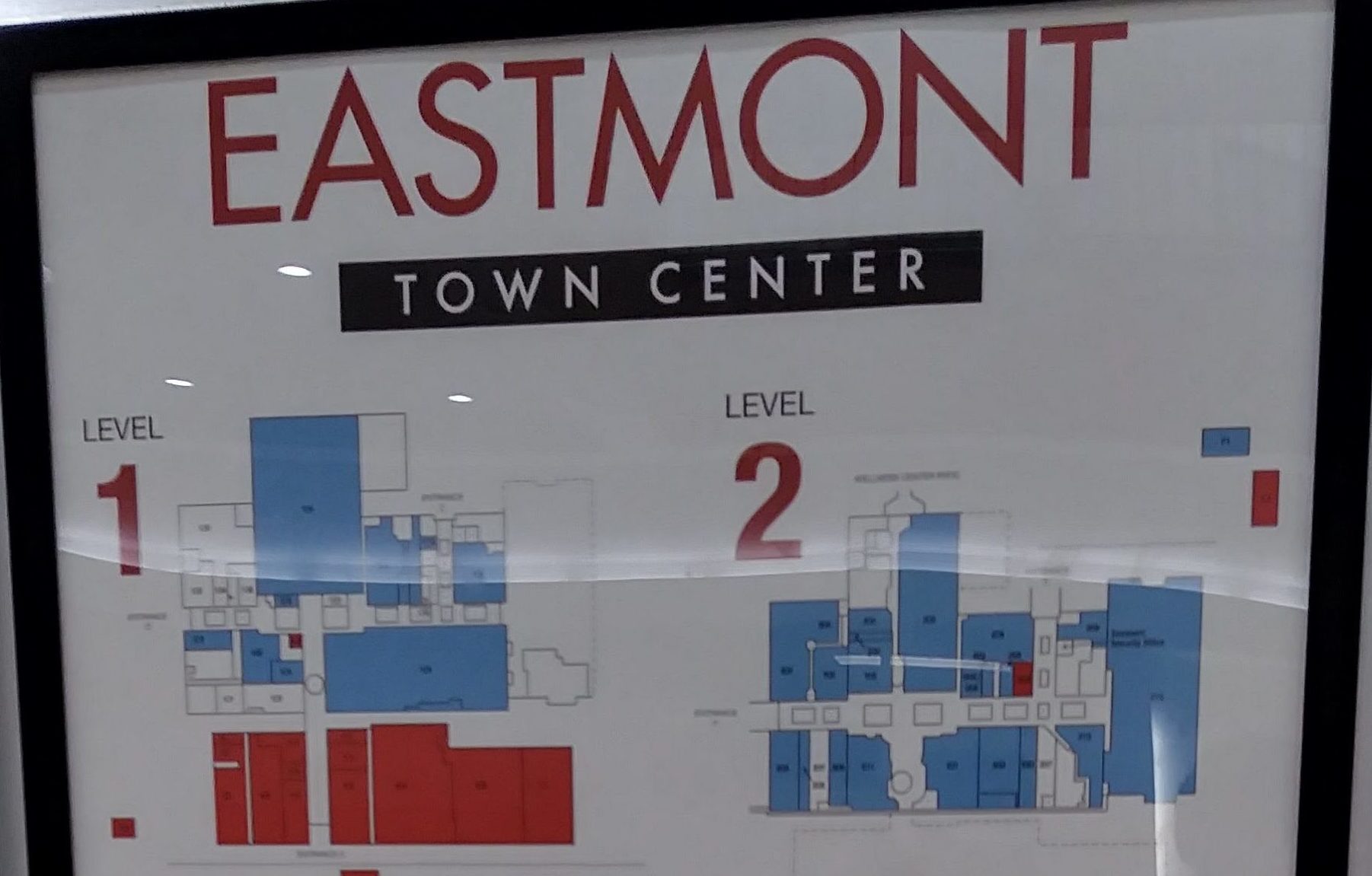

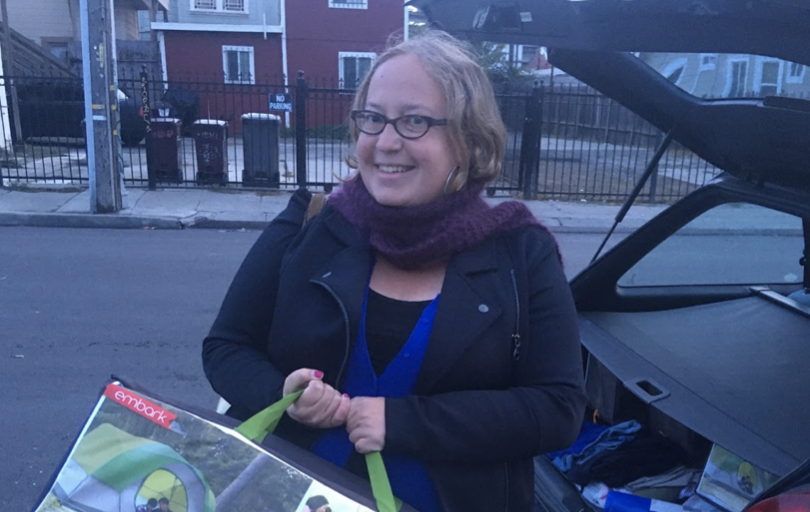
I believe that this is a clear story about several unhoused people. Thank you for sharing.